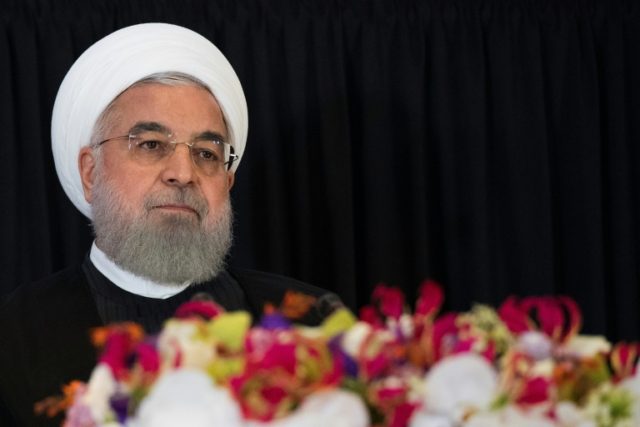Iranian President Hassan Rouhani officially rejected the abrupt resignation of the Islamic Republic’s Foreign Minister Javad Zarif, arguing in a letter to the to diplomat published on Wednesday that accepting his exit would be “against the country’s interest.”
Less than 48 hours after announcing his resignation via Instagram on Monday, Zarif was back to work, joining Rouhani and other Iranian officials during a ceremony welcoming Armenian Prime Minister Nikol Pashinyan.
“I think your resignation is against the country’s interests and I do not accept it,” Rohani wrote in the letter to Zarif posted on the Iranian government’s official website, Radio Free Europe/Radi Liberty (RFE/FL) noted.
“You are trusted by me and the whole Islamic establishment, particularly the supreme leader,” the Iranian president added, referring to Ayatollah Ai Khamenei who has the final word on all religious and political affairs in the Islamic Republic.
Rouhani went on to urge Iranian officials to work “in full coordination” with Zarif’s ministry on matters of foreign policy.
“I consider you, as put by the leader, to be ‘trustworthy, brave and pious’ and in the forefront of resistance against America’s all-out pressure,” the Iranian president reportedly said.
Dozens of Iranian officials and lawmakers also rallied behind Zarif, urging him to stay despite satisfaction with his resignation by some hardliners.
Citing the state-run Islamic Republic News Agency (IRNA), Al Jazeera noted that 135 lawmakers from different political affiliations also wrote a letter to Zarif asking him to remain in his post.
“The shocking and surprising report of the resignation of Dr. Mohammad Javad Zarif as the most committed, cherished, and competent minister in the eleventh and twelfth administrations… caused [sorrow] and concern,” the members of parliaments wrote, according to Tehran Times.
The FM reportedly explained in a post on Instagram that his “sole concern is to improve foreign policy and the credibility of the foreign ministry”.
He noted that his office is “the frontline in defense of national interests and the rights of the noble people of Iran”.
Echoing the FM, Qassem Soleimani, the powerful and influential commander of the elite Islamic Revolutionary Guard Corps’ (IRGC) Quds Force, reportedly proclaimed on Wednesday that Zarif is the main person “in charge of the foreign policy” of Iran, and “has always been supported by the top officials.”
The IRGC is considered an Iranian terrorist proxy by the United States, which has officially deemed the Islamic Republic as the world’s leading state-sponsor of terrorism.
Iran’s FM, one of the top architects of the crumbling nuclear deal reached between Tehran and U.S.-led world powers in 2015, announced his resignation via Instagram on Monday.
Zarif reportedly wrote, “I am apologizing to you for all the shortcomings … in the past years during my time as foreign minister … I thank the Iranian nation and officials.”
The announcement came as non-U.S. signatories (China, Russia, France, the U.K., Germany) to the nuclear pact — in which Iran agreed to curb its nuclear program in exchange for sanctions relief — scrambled to keep it alive after American President Donald Trump pulled the United States out of the agreement last year, arguing that it failed to restrain Iran.
Following the U.S. withdrawal from the controversial nuclear pact, the Trump administration reimposed sanctions suspended under the accord as part of a wave of restrictions implemented against the Iranian regime, a move that angered Tehran.
His resignation also came “amid mounting pressure from hard-line conservatives who have criticized his role in negotiating a landmark 2015 nuclear deal with world powers,” RFE/RL pointed out.
Tensions between parties and factions in Iran is a “deadly poison” in formulating foreign policy, Zarif told the Jomhuri Eslami newspaper this week, suggesting the FM may have stepped down due to pressure from hardline elements in the Shiite republic opposed to his role in negotiating the nuclear pact.
Although the FM did not explicitly provide a reason for stepping down on Monday, there “were speculations that his decision was linked to his exclusion from the meetings with [Syrian dictator Bashar al] Assad,” Al Jazeera reported.
Notably excluding Zarif, the Iranian Supreme Leader Ayatollah Ali Khamenei, President Rouhani, and Soleimani met with Assad in Tehran on Monday.
Responding to Zarif’s resignation on Monday, U.S. Secretary Mike Pompeo wrote on Twitter, “We’ll see if it sticks.”
“Our policy is unchanged – the regime must behave like a normal country and respect its people,” he added.
Prime Minister Benjamin Netanyahu from Iran’s regional enemy Israel welcomed the FM’s exit, writing on Twitter “Zarif is gone. Good riddance.”
“Iran’s economic indicators have been generating nothing but concern over the past months,” Al Jazeera acknowledged. “Growth is dismal, the national currency has depreciated substantially, and prices have soared.”

COMMENTS
Please let us know if you're having issues with commenting.